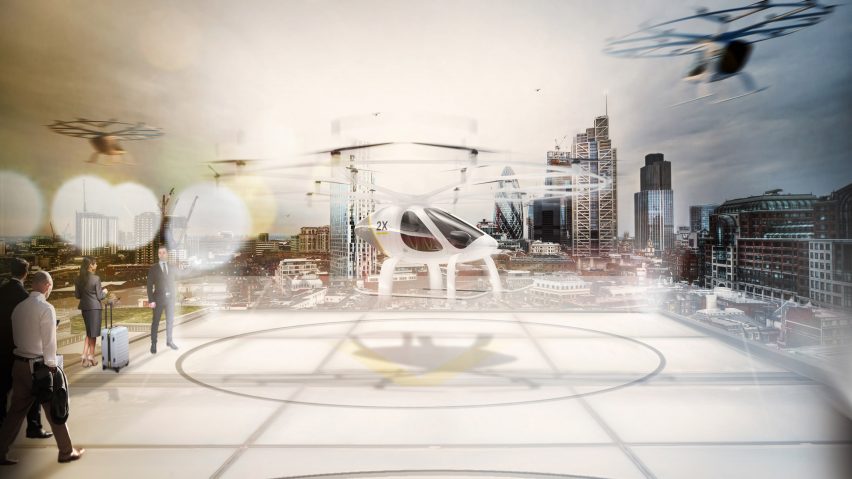Landing and recharging pads for drones will become ubiquitous atop urban buildings within a few years, according to a company that is buying up London rooftops for a network of drone ports.
Duncan Walker of Skyports told Dezeen that "vertiports" will become as common as facilities for bicycles or cars in the near future, as unmanned aerial vehicles (UAVs) become prevalent for deliveries and transportation.
"I can see it being absolutely commonplace," said Walker, who is managing director of Skyports. "Just as we were designing bike parking spaces into buildings five years ago, I can see drone ports becoming standard in buildings."
Elevation, Dezeen's recent documentary about how drones will change cities, predicts that delivery and passenger flights will become common in the near future. Walker agreed that the movie's predictions are realistic, saying that these developments are "on the very near-term horizon."
Skyports buys up London rooftops
Skyports is acquiring rooftop spaces in London that it will eventually convert into vertiports – facilities for aircraft that take off and land vertically – once the regulatory barriers to urban drone flights have been cleared. Walker expects this to happen within just a few years.
The startup has already bought the rights to 15 rooftops in London. "We want to scale that up to 80 or 100 over the course of the next 18 months," Walker said.
Skyports has appointed London-based architect Barr Gazetas to work on designs for its vertiports, which could be located on any building type, with multi-storey car parks, office buildings and railway stations among the properties already signed up by the company. The ports will include facilities for recharging as well as loading and unloading.
London lagging behind on drone transportation
"There are many city buildings where vertiports can be efficiently and sensitively incorporated, from historic blocks and shopping centres to open spaces," said Barr Gazetas director Jon Eaglesham. "We are designing discreet, efficient, secure and environmentally friendly places, that will promote a new level of connectivity within the city."
He added: "Air taxis might feel like a futuristic invention, but they will soon be filling our skies."
London is lagging behind other cities when it comes to developing an infrastructure for drone transportation, Walker said, due to the complexity of its airspace. Switzerland, Finland, Dubai and China are leading the way, with the USA catching up fast.
"Other places that have got simpler airspace to deal with are a little further ahead of the game," he said. "There's lots of activity in Finland and Switzerland is particularly progressive – they want to be the leaders of this technology."
"China is managing huge numbers of drones in the air already," he added. "Dubai is right at the forefront, with drones expected to be carrying passengers by 2020. And the west coast of the US, where a lot of technological development is happening, is beginning to come on stream with it."
Switzerland leads the way
In Switzerland, vertiports are already being used on a daily basis to service drones carrying medical supplies between laboratories and hospitals, Walker said.
"Landing pads are an integral part of the urban landscape in Lucerne, Lugano, Bern and many other places already. There are 500 drone flights a month in Switzerland. It's becoming the norm there for certain use cases."
Walker believes that drone flights from vertiports could be a regular occurrence in London as soon as 2021, with medical delivery services likely to be the first to market and passenger flights coming shortly after that.
"There is an argument that says passengers may come first, because if you put a pilot in these things they are effectively electric helicopters," he added. "That has the benefit of being way cheaper and way quieter than a combustion-engine helicopter. So it could be that passengers come before cargo. We're slightly of the opinion that cargo might come first but time will tell."
Drone deliveries in London "by 2021"
Walker is confident that regulatory hurdles in London will quickly be overcome, saying that the Civil Aviation Authority, which regulates airspace in the UK, is working with the industry to agree a legal framework that will allow urban drone flights.
"We've got very complicated airspace in the UK, particularly in London," Walker said. "We've got four or five airports around us, we've got quite a densely-used airspace and we've also got a historic city beneath us."
"So the aviation authority, who we are engaging with on a monthly basis, is quite cautious. But they've got an entire drone team and they recognise it's coming," Walker concluded.

